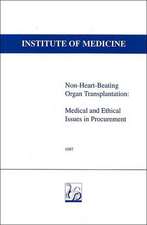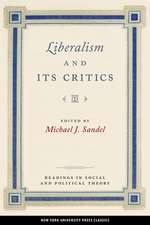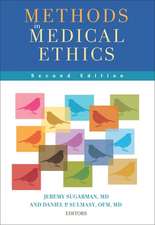The Case against Perfection – Ethics in the Age of Genetic Engineering
Autor Michael J. Sandelen Limba Engleză Paperback – 28 sep 2009
"Sandel explores a paramount question of our era: how to extend the power and promise of biomedical science to overcome debility without compromising our humanity. His arguments are acute and penetrating, melding sound logic with compassion."
--Jerome Groopman, author of How Doctors Think
Preț: 160.63 lei
Preț vechi: 169.08 lei
-5% Nou
30.74€ • 31.90$ • 25.69£
Carte disponibilă
Livrare economică 24 februarie-10 martie
Specificații
ISBN-10: 0674036387
Pagini: 176
Dimensiuni: 114 x 178 x 14 mm
Greutate: 0.16 kg
Editura: Harvard University Press
Public țintă
Academic/professional/technical: Research and professionalDescriere
"Sandel explores a paramount question of our era: how to extend the power and promise of biomedical science to overcome debility without compromising our humanity. His arguments are acute and penetrating, melding sound logic with compassion."
--Jerome Groopman, author of How Doctors Think
Breakthroughs in genetics present us with a promise and a predicament. The promise is that we will soon be able to treat and prevent a host of debilitating diseases. The predicament is that our newfound genetic knowledge may enable us to manipulate our nature--to enhance our genetic traits and those of our children. Although most people find at least some forms of genetic engineering disquieting, it is not easy to articulate why. What is wrong with re-engineering our nature?
The Case against Perfection explores these and other moral quandaries connected with the quest to perfect ourselves and our children. Michael Sandel argues that the pursuit of perfection is flawed for reasons that go beyond safety and fairness. The drive to enhance human nature through genetic technologies is objectionable because it represents a bid for mastery and dominion that fails to appreciate the gifted character of human powers and achievements. Carrying us beyond familiar terms of political discourse, this book contends that the genetic revolution will change the way philosophers discuss ethics and will force spiritual questions back onto the political agenda.
In order to grapple with the ethics of enhancement, we need to confront questions largely lost from view in the modern world. Since these questions verge on theology, modern philosophers and political theorists tend to shrink from them. But our new powers of biotechnology make these questions unavoidable. Addressing them is the task of this book, by one of America's preeminent moral and political thinkers.

















![Death by Medicine [With DVD]](https://i1.books-express.ro/bt/9781607660064/death-by-medicine-with-dvd.jpg)


